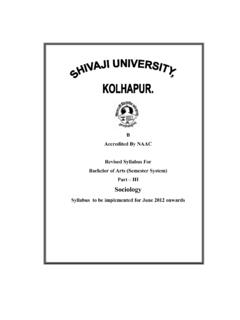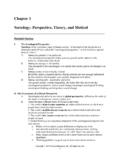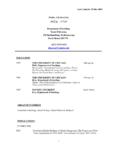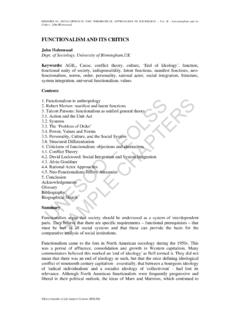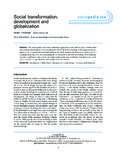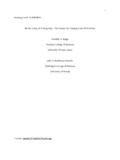Transcription of PSYCHOSOCIAL FACTORS AT WORK - who.int
1 OCCUPATIONAL SAFETY AND HEALTH SERIES No. 56 PSYCHOSOCIAL FACTORS AT WORK: Recognition and control Report of the Joint ILO/WHO Committee on Occupational Health Ninth Session Geneva, 18-24 September 1984 INTERNATIONAL LABOUR OFFICE GENEVA Copyright International Labour Organisation 1986 Publications of the International Labour Office enjoy copyright under Protocol 2 of the Universal Copyright Convention. Nevertheless, short excerpts from them may be reproduced without authorisation, on condition that the source is indicated.
2 For rights of reproduction or translation, application should be made to the Publications Branch (Rights and Permissions), International Labour Office, CH-1211 Geneva 22, Switzer-land. The International Labour Office welcomes such applications. ISBN 92-2-105411-X ISSN 0078-3129 First published 1986 French and Spanish editions of this report have been published under the titles: Les facteurs psychosociaux au travail: Nature, incidences et pr vention (ISBN 92-2-205411-3) and Factores psicosocia/es en el trabajo.
3 Naturaleza, incidencia y prevenci n (ISBN 92-2-305411-7) The designations employed in ILO publications, which are in conformity with United Nations practice, and the presentation of material therein do not imply the expression of any opinion whatsoever on the part of the International Labour Office concerning the legal status of any country, area or territory or of its authorities, or concerning the delimitation of its frontiers. The responsibility for opinions expressed in signed articles, studies and other contri-butions rests solely with their authors, and publication does not constitute an endorse-ment by the International Labour Office of the opinions expressed in them.
4 Reference to names of firms and commercial products and processes does not imply their endorsement by the International Labour Office, and any failure to mention a particular firm, commercial product or process is not a sign of disapproval. ILO publications can be obtained through major booksellers or ILO local offices in many countries, or direct from ILO Publications, International Labour Office, CH-1211 Geneva 22, Switzerland. A catalogue or list of new publications will be sent free of charge from the above address.
5 Printed in the German Democratic Republic ZIM PREFACE In accordance with a decision of the Governing Body of the International Labour Office, in agreement with the WHO, the Ninth Session of the Joint ILO/WHO Committee on Occupational Health took place from 18 to 24 September 1984 at ILO headquarters in Geneva. The item on the agenda was the "Identification and Control of Adverse PSYCHOSOCIAL FACTORS at Work". Mr. Georges Spyropoulos, Chief, Working Conditions and Environment Department of the ILO, opened the meeting on behalf of the Directors-General of the World Health Organisation and the International Labour Office.
6 He pointed out that the meeting represented a new example of the efforts undertaken by the ILO and WHO to act together to improve the complementarity of their programmes to protect workers' health. It was acknowledged that the importance of the PSYCHOSOCIAL environment of workplaces was increasing. It was generally agreed that economic growth, economic progress, increased productivity and social stability depended not only on the different means of production available, but also on working and living conditions and the health and well-being of workers and their families.
7 This realisation led to the development of a global preventive action, taking account not only of physical and chemical hazards, but also of the various PSYCHOSOCIAL FACTORS inherent in enterprises, which could have a considerable influence on the physical and mental well-being of workers. The ILO's International Programme for the Improvement of Working Conditions and Environment (PIACT) also stressed the importance of closer collaboration between the groups principally concerned in this field: employers and workers.
8 As a result of accelerating technological change, the debate on the relation between technical progress and health and well-being at work had recently become extremely animated. It was essential that this debate should be conducted more calmly and with a clearer sense of reality. Dr. Alexander Cohen was elected Chairman, and Prof. Lennart Levi, Vice-Chairman. Dr. N. Pardon and Dr. R. Kalimo were elected Reporters. Dr. M. El Batawi, Chief of the Occupational Health Unit of the World Health Organisation, recalled that the World Health Assembly had discussed the topic of PSYCHOSOCIAL FACTORS and health over several years, starting in 1974, and had adopted several resolutions requesting the Director-General to develop a global multidisciplinary programme of work, to apply existing knowledge in order to improve PSYCHOSOCIAL health and health care.
9 And to develop methods in collaboration with countries so that PSYCHOSOCIAL information could be made available to health 51974 v planners and new knowledge could be acquired on which health action can be based. The Occupational Health Programme of the WHO had undertaken several studies of the PSYCHOSOCIAL implications of industrialisation in developing countries, as well as a state-of-the-art review on PSYCHOSOCIAL FACTORS in health. To cite only some of the recent examples: the WHO had reviewed the PSYCHOSOCIAL health status of migrant workers in various parts of the world; in 1982, the WHO examined the role of PSYCHOSOCIAL FACTORS in relation to injury prevention; in 1983, a preparatory meeting on the identification and control of PSYCHOSOCIAL FACTORS at work was organised by the WHO in order to prepare a document to be used by the Joint ILO/WHO Committee on Occupational Health.
10 Mr. G. Kliesch, Chief of the Occupational Health and Safety Branch of the ILO, stressed that, since its formation, the Office had been concerned with the PSYCHOSOCIAL environment. He cited, amongst other activities, the first session of the Joint ILO/WHO Committee on Occupational Health (1950) which, in defining the objectives of occupational health, emphasised the need to place and maintain workers in jobs corresponding to their physiological and psychological capacities. The Joint ILO/WHO European Conference on the Industrial Medical Officer's Contribution to the PSYCHOSOCIAL Environment in Industry (London, 1959) considered that the PSYCHOSOCIAL climate of a group depended not only on its structure and living conditions but on an entire range of sociological, demographic, economic and social problems.










